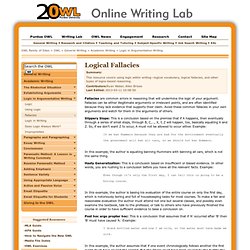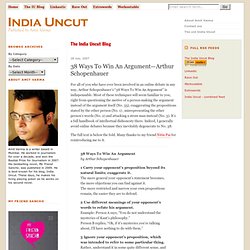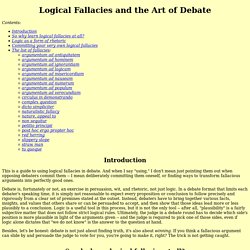

Logic in Argumentative Writing. Summary: This resource covers using logic within writing—logical vocabulary, logical fallacies, and other types of logos-based reasoning.

Contributors:Ryan Weber, Allen BrizeeLast Edited: 2013-03-11 10:08:50 Fallacies are common errors in reasoning that will undermine the logic of your argument. Fallacies can be either illegitimate arguments or irrelevant points, and are often identified because they lack evidence that supports their claim. Avoid these common fallacies in your own arguments and watch for them in the arguments of others. Slippery Slope: This is a conclusion based on the premise that if A happens, then eventually through a series of small steps, through B, C,..., X, Y, Z will happen, too, basically equating A and Z. If we ban Hummers because they are bad for the environment eventually the government will ban all cars, so we should not ban Hummers. In this example, the author is equating banning Hummers with banning all cars, which is not the same thing.
Cialdini's Six Principles of Influence - Communication Skills Training from MindTools. Convincing Others to Say "Yes" (Also known as the Six Weapons of Influence) How do you influence others?

© iStockphoto/blackred You've come up with a fantastic idea for a new product. Now you need to convince everyone to support it. However, you haven't had much success with this in the past. Influencing others is challenging, which is why it's worth understanding the psychological principles behind the influencing process. This is where it's useful to know about Cialdini's Six Principles of Influence. In this article, we'll examine these principles, and we'll look at how you can apply them to influence others. About the Six Principles The Six Principles of Influence (also known as the Six Weapons of Influence) were created by Robert Cialdini, Regents' Professor Emeritus of Psychology and Marketing at Arizona State University. The six principles are as follows: 1. As humans, we generally aim to return favors, pay back debts, and treat others as they treat us.
38 Ways To Win An Argument—Arthur Schopenhauer - The India Uncut Blog - India Uncut. For all of you who have ever been involved in an online debate in any way, Arthur Schopenhauer’s “38 Ways To Win An Argument” is indispensable.

Most of these techniques will seem familiar to you, right from questioning the motive of a person making the argument instead of the argument itself (No. 35), exaggerating the propositions stated by the other person (No. 1) , misrepresenting the other person’s words (No. 2) and attacking a straw man instead (No. 3). It’s a full handbook of intellectual dishonesty there. Indeed, I generally avoid online debates because they inevitably degenerate to No. 38. The full text is below the fold. Many thanks to my friend Nitin Pai for reintroducing me to it. 38 Ways To Win An Argumentby Arthur Schopenhauer 1 Carry your opponent’s proposition beyond its natural limits; exaggerate it. Yes! 50 Scientifically Proven Ways to Be Persuasive « alex.moskalyuk.
Effective Persuasion Presentation. Ten Timeless Persuasive Writing Techniques. Logical Fallacies: The Fallacy Files. Logical Fallacies and the Art of Debate. Contents: Introduction This is a guide to using logical fallacies in debate.

And when I say "using," I don't mean just pointing them out when opposing debaters commit them -- I mean deliberately committing them oneself, or finding ways to transform fallacious arguments into perfectly good ones. Debate is, fortunately or not, an exercise in persuasion, wit, and rhetoric, not just logic. In a debate format that limits each debater's speaking time, it is simply not reasonable to expect every proposition or conclusion to follow precisely and rigorously from a clear set of premises stated at the outset. Besides, let's be honest: debate is not just about finding truth, it's also about winning.
So why learn logical fallacies at all? I can think of a couple of good reasons. Second, and maybe more importantly, pointing out a logical fallacy is a way of removing an argument from the debate rather than just weakening it. Logic as a form of rhetoric Committing your very own logical fallacies. A List Of Fallacious Arguments 3.1 Beta 3.